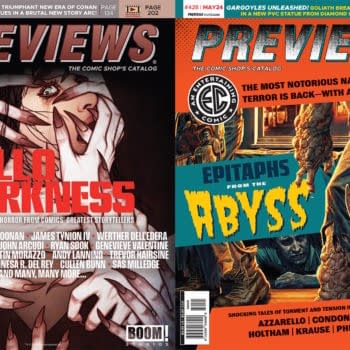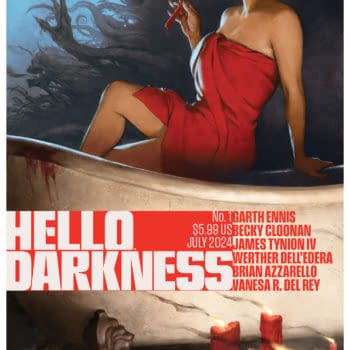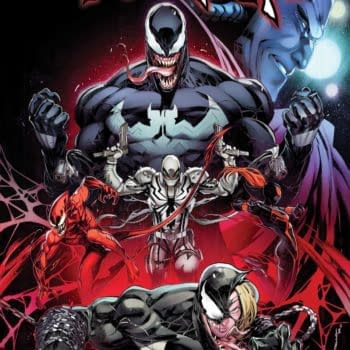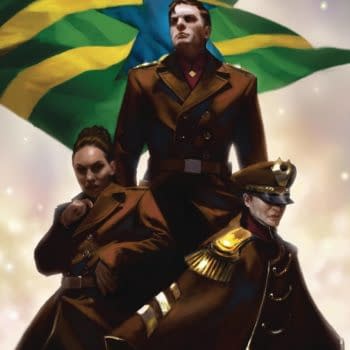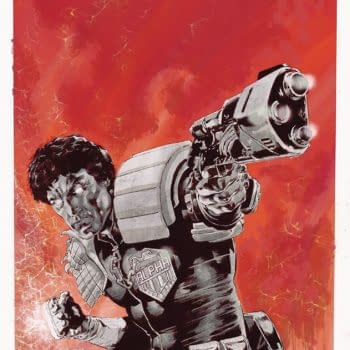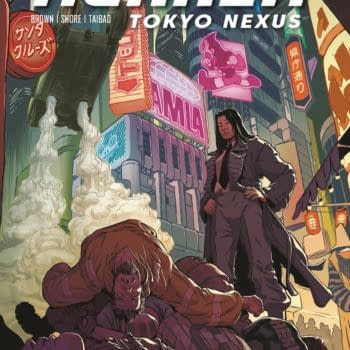Posted in: Comics | Tagged:
Scott Dunbier, The Big Fish That DC Comics Let Get Away

I am spending the day reading the WildStorm Oral History published independently and unofficially to coincide with WildStorm's 25th anniversary. It's available right here, in print and in digital. And it's letting me revisit old stomping grounds..
Scott Dunbier is a Director of IDW Entertainment, working on "Special Projects" – which tends to be whatever piques his interest. He pioneered the Artist's Edition format, reproducing original art boards of comics as close to the originals as possible, then printing them full size. It's a format that has been copied by DC, Dark Horse, Dynamite, Titan and more.
But before IDW, he was EIC of WildStorm Comics. Where he innovated the Absolute format for the Authority hardcover, an oversized thick hardcover reprint on glossy pages with 12 issues or more – a thicker version of the French albums – which then was picked up by DC Comics across their titles, copied by Marvel – and then everyone else too.
The Oral History tells the story of that battle – and how Dunbier was eventually fired by DC President Paul Levitz. I write plenty of gossipy pieces at the time. It's intriguing to see what gets confirmed – and what I had no idea about. Here are a few snippets.
CP Smith: Scott Dunbier was the WildStorm Art Dealer and I don't know if anyone remembers this, but WildStorm had this huge, huge art collection, and this was before the internet, maybe there was the internet, but if so, you had to pay by the minute or whatever, and there wasn't—I mean, it's not like you could download a picture. To have access to the WildStorm Art Library was incredible, it was an incredible education because it wasn't just the guys from WildStorm, it was like the unprinted Kevin Nowlan graphic novel with all the originals. Jim had that Michael Golden, Spiderman versus Hulk issue which is ridiculous, I mean there was crazy stuff in that library. It was a pure education like you couldn't have got. I wouldn't have been able to feel that stuff or learn about all that stuff if it wasn't for that library and probably all the other artists who showed me stuff and showed me what to study.
Lee Bermejo: Without Scott, I wouldn't have a job. Scott was my cheerleader the whole time. Jonathan Petersen as well, but he was only there for a year when I got there. Jonathan was also very supportive of me, and was convinced that it was a good idea to give me a job, but Scott was really the guy the whole time—he understood what kind of artist I was from day one, and I think he was waiting for my ability to catch up to what he wanted to see.
Laura Martin: The caliber of artist that he brought in, the caliber of books that he brought into WildStorm, he was such a huge part of bringing Alan Moore there, and that's massive, and even the amount of level of work that he brought out of people at WildStorm was astounding and of course, his love of fine art and comics collectible art goes unmatched. He has been huge for that stuff.
Gene Ha: One of the things that Scott's doing now that's just hilarious to me is that he's doing that series of Artist Edition books. Almost all of them are for books that IDW itself doesn't have the license for which means if the company that has the easiest legal opportunity to publish each of these books is the owner of the content. If somebody's going to do an Artist Edition of Daredevil, it should be Marvel. If they'd do a Walt Simonson Thor book, it should be Marvel. If they're going to do a Kamandi, Jack Kirby, it should be DC. But they don't do it because they don't have Scott Dunbier's creative vision and also his ability to contact people, make connections, keep track of, frankly, the geek world that collects original art.
Ed Roeder: The idea of those super large editions, I think Scott and Jim and those guys, got those ideas because they were looking at a lot of European books. And then when we started those first Absolute books [oversize, slipcased hardcover editions], usually for an Absolute book, you're looking at about 30 to 40 design pages for breaks and little special pages and stuff like that. And I think the idea was to build a book that people would buy and hold on to. It was really about, "Hey we're going to print these, and we'll cap at limited edition numbers." It's not like they're going to go print 50,000 Absolute books.
Richard Bruning: Scott is the one that solved the Absolute Editions. Originally, Paul just didn't like the idea. Paul's interesting, he wasn't one of those guys that tried to take every dollar out of your pocket. He would try to avoid putting out product that is so expensive and so rare that the average fan could never even conceive of getting that. So he was always a little reluctant about doing really high end products. We were able to talk Paul into trying one, and it sold like hot cakes. It just flew out the door. So Scott got to go, "I told you so, I told you so."
John Layman: He was the one who would smooth the waters with Alan Moore and do his best to try to keep us separated from the wrath of Paul Levitz.
Richard Bruning: Scott would try to get away with little things here and there. He would try to sneak stuff in his books and hope that no one was going to catch it. And on occasion, he'd get caught, and we'd have to slap his wrist, and they'd go, "Don't do that again, Scott." And he'd be, "Okay."
Claudia Chong: There were a few times Production had to erase flying penises on a title. I'm not lying [laughs]. It's like, "Scott, really. You didn't see these on the art boards that you were approving?" "No, nobody's seen them."
Chris Sprouse: With WildStorm, what we turned in was what was published, and Scott created that environment where—I remember at first turning in stuff for Tom Strong and sort of waiting to hear back from him like, "Is it okay? Any changes? Is it all right?" He'd be like "Yes. You're one of the creators, you turn in the pages, this is what we're publishing." And I was like "Oh. Wow. Okay. That's neat. That's refreshing." I'm used to it being someone else's property that they're nitpicking over.
Alex Sinclair: I don't think it was fair how he was moved out. But as I learned later on, once Paul gets his crosshairs on you, you're screwed. Look at his record with IDW, and what he's doing there now that he's driving the bus again. Nothing against DC, it's just it wasn't Scott's style.
Gene Ha: Scott Dunbier had gotten between Alan Moore and Paul Levitz [and] both sides felt like shooting the messenger. He was a loyal employee of DC Comics, but he was also super-loyal to creatives—Alan Moore as much as anybody. When he had to carry a message to Alan Moore, "Yes, you know that League of Extraordinary Gentleman: Black Dossier book? Yes, we're going to have to cut some parts out." Alan blamed Scott. Scott would have rather not made those cuts or changes, but in the end, he's the guy who's working under contract as an employee. He'd do as much as he could do, and that's all there is to it.
John Layman: He definitely had the eye and the knack for putting teams together and for bringing home the awards. And I certainly love the fact that after Paul Levitz and DC gave him the shaft and got rid of him, that he's bringing home award after award after award for IDW. That is the best revenge.






